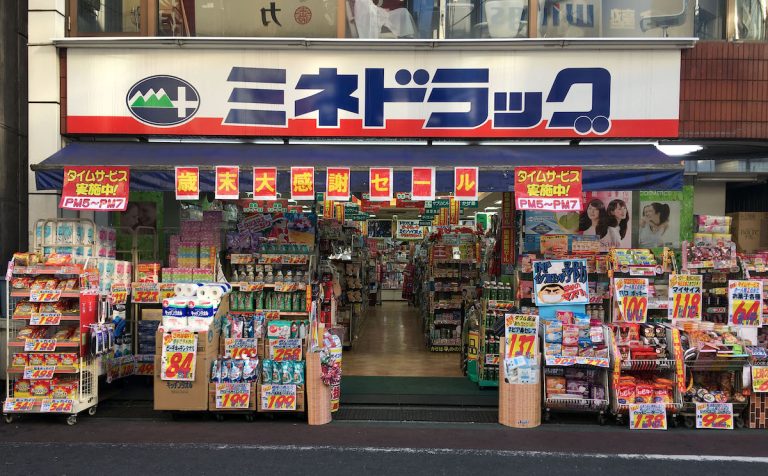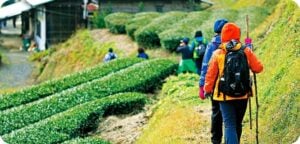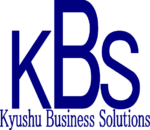
Finding the right medication, or 薬 (kusuri) in Japanese, can be tricky at the best of times. Entering a bright florescent lit drug store with a pounding headache makes the job even more of a pain. Add to your woes a foreign language, and you have a recipe for a bad time. Today we are going to look at common vocabulary found in a Japanese drug store, which will help you get in and out with confidence, so that you can get back to enjoying your time in Japan.
Where to buy medication in Japan
There are two types of stores that sell medication in Japan. First are the commonly found “drug stores”, or ドラッグストア in Japanese. Most drug stores will have a unique name, but include the word drug in their signage. The store in the photo above is called “Mine drug”. Drug stores are very common and plentiful in Japan. If you can remember the characters “ドラッグ” you will have no problem finding a drug store near you. Another way is to search through google maps with the keyword ドラッグ, as this will give you hits for all the different chain brands.
Drug stores sometimes have a registered pharmacist in store, but are generally more along the lines of a supermarket, specializing in medication. This means they primarily deal in over the counter medications, beauty care, toiletries and health foods. Somewhat ironically they are also a great place to buy snacks and sweets. If you believe you need more serious medication, you may need to visit a clinic and see a doctor or nurse. They can prescribe you better medication, which you can purchase at a pharmacy, or 薬局 (yakyoku) in Japanese.
Common ailments, lingo and their kanji

The most common ailments and their treatments can be obvious to us, but dealing with them in a foreign language may not be so easy. Here is a list of common problems, and their translation into Japanese. Look for these kanji over the aisles, or ask a staff member to find the right section.
| English | Phonetic | Japanese |
|---|---|---|
| Headache | zu tsu | 頭痛 |
| Paracetamol | para seta molu | パラセタモール |
| Ibuprofen | ibuprofen | イブプロフェン |
| Common cold | ka ze | 風邪 |
| Runny nose | hana mizu / mizu bana | 鼻水/ 水洟 |
| Blocked nose | hana tsu maru | 鼻詰まる |
| Sore throat | nodo kaze | 喉風邪 |
| Stomachache | fuku tsu | 腹痛 |
| Constipation | ben pi | 便秘 |
| Diarrhea | ge ri | 下痢 |
| Allergy | arerugi | アレルギー |
| Dust mite | chiridani | 塵蜱 |
| Hay fever | kafunshyo | 花粉症 |
| Mask | masuku | マスク |
| Bug bite | mushisare | 虫刺され |
| Mosquito | ka | 蚊 |
| Tatami mite | dani | ダニ |
| Itch | ka yui | 痒い |
| Cuts/ abrasions | kizu | 傷 |
| Disinfectant | shyoudokusai | 消毒剤 |
| Band-Aid | katoban | カットバン |
Dosage and instructions
Being able to find and buy the correct medicine is all good and well, but what about being able actually use it? Let’s take a look at the most important kanji for how to use the medicine.
服用量 (fukuyouryou) : This is the dosage section of medicine instructions.
1回3錠:This is the daily dosage. The 回 means how many times to take the medicine per day. The 錠 means how many pills each time. In the example, the example instructions inform you to take 3 pills once a day.
副作用 (fukusayou): The section will illuminate any possible side effects. Common side effects can include;
- 眠気: Drowsiness
- 吐き気: Nausea
- 便秘: Constipation
- 下痢: Diarrhea
- 口渇: Dry mouth
Dealing with Allergies in Japan

The Japanese cypress causes millions to suffer from allergies each year.
Every year millions of people in Japan suffer from allergic reactions to pollen in the air. The pollen exists for most of the year, from different sources.
From February to April, the Japanese cedar tree called sugi causes hayfever. Then March to May the cypress hinoki takes over. From May to August the rice plant ine can cause irritation. Finally from August to October the ragweed butakusa and the Artemisia yomogi continue to make the going tough. Many people who come to Japan do not initial suffer from these pollen, but year in year out breathing it in can lead to allergies developing. If you find yourself with itchy eyes and nose and sneezing, you might have developed such allergies. The drug store stocks many medications that can help, as well as allergy reducing masks. Simply wearing a mask and maintaining good hand washing practices helps reduce reactions tremendously.
In summary, a medical wordlist
The words we revealed in this article are very helpful when finding medication in Japan. Memorize or jot down the words you think you will need, and save yourself further headache when shopping for medication.
| English | Japanese | Phonetic |
|---|---|---|
| Drugstore | ドラッグストア | doragu sutoa |
| Pharmacy | 薬局 | yakyoku |
| Medicine | 薬 | kusuri |
| Symptoms | 症状 | shououjou |
| Dosage | 服用量 | fukuyouryou |
| Side effects | 副作用 | fukusayou |
| Allergy | アレルギー | arerugi |
| Get well soon | お大事に | odaijini |
I hope this article will help you get though some difficulties a little easier, so that you can quickly get back to enjoying your time in Japan.
お大事に!













